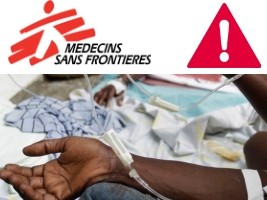|
||||||||||||||||||
|
|
iciHaiti - Cholera : Médecins Sans Frontières close to saturation, treats 270 patients a day 18/11/2022 09:02:47
The number of cholera cases is increasing in a very worrying way in Port-au-Prince and in several departments of the country, alert Médecins Sans Frontières (MSF). The international NGO alone has more than 60% of the bed capacity to treat cholera patients in the capital "Our current centers are saturated, and we will soon be at the maximum of our intervention capacities" worries Mumuza Muhindo, Head of Mission, referring to the 389 beds very often occupied in the 6 Cholera Treatment Centers (CTC) set up by MSF since the appearance of the first cases on September 29th. "Since the end of October, we have been treating an average of 270 patients a day in our centers, while we only received around fifty in the first two weeks. In total, we admitted more than 8,500 patients and recorded 97 deaths, a very worrying development." MSF also organized the chlorination of around 100 water points and the installation of 8 oral rehydration points where basic products and clean water are distributed. MSF and the few organizations involved in the response will not be able to overcome this outbreak of cholera alone. Other humanitarian actors and donors must join the response effort, by setting up CTCs, or by urgently strengthening activities for access to drinking water, sanitation and rehydration solutions. oral underlines the NGO. The Haitian authorities have made an official request to the ICG, the international mechanism for coordination of the vaccine response, to obtain doses of vaccine against cholera. MSF stands ready to start implementing a vaccination campaign, in support of health authorities and in addition to other water, sanitation and health promotion activities. As the number of cholera cases increases in the various municipalities of the capital but also in other departments, it remains difficult to assess the real extent of the epidemic "The saturation of CTCs which prevents treatment of all patients, difficulties for the sick to travel due to fuel shortages and insecurity, or the increase in community deaths, which are difficult to quantify, are worrying signs," said Michael Casera, epidemiologist at MSF deplores "Often, patients who present severe symptoms during the night in the neighborhoods most affected by insecurity must stay at home because motorcycle taxis refuse to transport them to a health center." IH/ iciHaiti
|
|
Why IciHaiti ? |
Contact us |
Français
Copyright © 2010 - 2026 IciHaiti.com |




